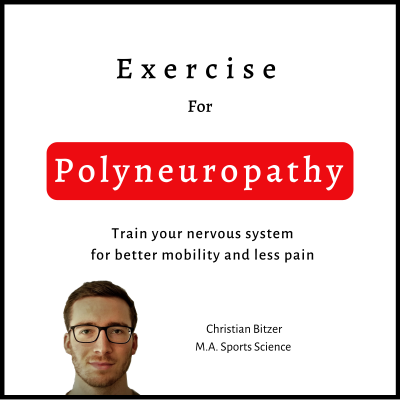Creatine can protect the nerves in some diseases - But does creatine help with polyneuropathy, too?
Creatine has already been shown to help with some neurological conditions and may protect nerves from damage.
For example, in amyotrophic lateral sclerosis and strokes, creatine appears to have a protective effect on nerves. Therefore, it is suspected that creatine may also be helpful in polyneuropathy. It is also believed that creatine can protect the myelin layer that surrounds the nerves and is important for the transmission of signals.
In addition, creatine has long been used by athletes, especially bodybuilders. It is expected to provide better training effects and more muscle growth. Since many people who suffer from polyneuropathy lose their muscles and strength, many hope that creatine could help them. In this article I would like to present what studies there are on the subject and whether creatine makes sense as a dietary supplement in polyneuropathy. And answer the question: does creatine help with polyneuropathy?
Briefly summarized: Creatine unfortunately does not help with polyneuropathy
In studies comparing creatine with placebos, creatine was found to be of no benefit in polyneuropathy. Creatine can have a positive effect on the energy metabolism of nerve cells in some diseases. However, in polyneuropathy, energy metabolism is not the cause of the disease and therefore creatine does not help.
Promising in healthy athletes and mice
Taking creatine in addition to the normal diet as a dietary supplement causes some improvement in muscle strength in animal studies with mice. It has also been observed in young men that there is at least some effect on muscle function (although this is not completely clear and is the subject of intense debate).
Polyneuropathy studies
That something works in animals and with young athletes is one thing, but whether it works with polyneuropathy patients needs to be verified first.
A study at the University of West Virginia therefore investigated whether creatine can improve the effect of strength training in patients with polyneuropathy. For this purpose, patients with polyneuropathy were divided into two groups, both of which performed strength training. One of the two groups received additional creatine, the other group only placebos. After 12 weeks of training, both groups showed improvement in muscle strength. However, this effect was the same in both groups, and creatine did not produce any additional improvement. (You can read the study here)
Incidentally, the study also recorded how active the test subjects were in everyday life. Again, there was no effect of the creatine.
There have been other studies in which effects on muscle metabolism were observed, but there was no improvement in strength, or in the ability of polyneuropathy patients to move (Doherty et al. 2001; Smith et al. 2006).
Thus, creatine does not appear to have any effects on motor function in polyneuropathy patients. Unfortunately, no high-quality studies have yet been conducted to determine whether creatine can help alleviate the pain and discomfort associated with polyneuropathy. However, it can be assumed that there is no benefit of creatine in this regard either.
Creatine probably only affects energy metabolism
But then why does creatine protect in other nerve diseases and not help in polyneuropathy?
It seems that creatine is helpful when nerve diseases affect the energy metabolism of the nerves. This happens, for example, when a stroke causes a lack of oxygen, or when the mitochondria in the nerve cells no longer function properly. However, this is usually not the case in polyneuropathy. Therefore, creatine does not appear to bring improvements for polyneuropathy patients.
Training without supplements is enough
Even if the creatine does not bring any additional effect, one can draw a positive conclusion from the presented study: Even those who suffer from polyneuropathy can improve their muscle strength with the right training. And this does not even need additional supplements. The training alone already strengthens the muscles.
This means that with targeted training one can counteract the slow decline in fitness that many people suffering from polyneuropathy experience.
So if you invest in your fitness, you will be rewarded, even if you suffer from polyneuropathy.
More info on nutrition in polyneuropathy can be found here: Nutrition in polyneuropathy
If you suffer from pain due to polyneuropathy, you can find tips for self-help here: Pain in polyneuropathy and what you can do about it
Specific exercises for polyneuropathy
If you want to learn specific exercises that help against polyneuropathy you will find detailed instructions on the following page:
